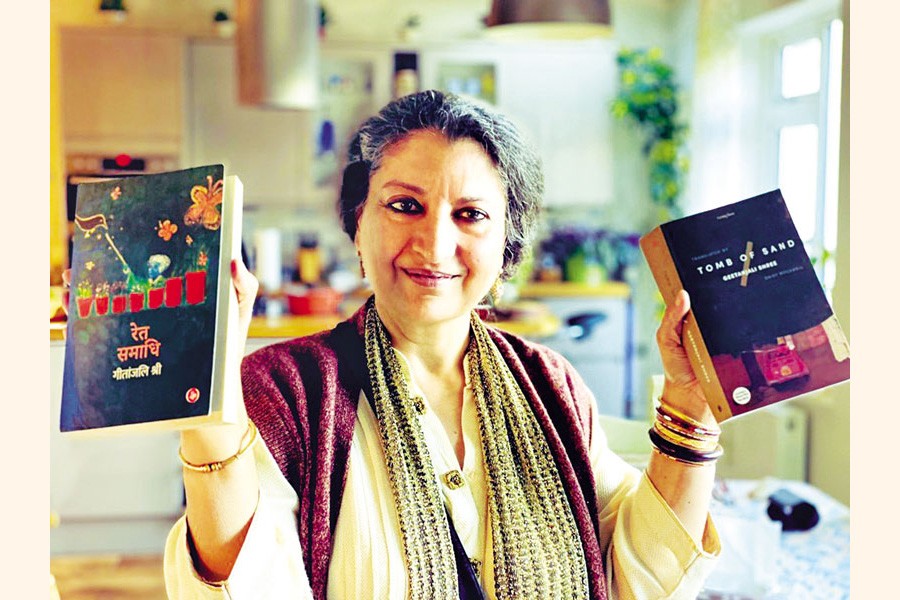The contemporary Hindi literature has been marked with the presence of Dalit and lower schedule caste women who write on socio-politics, women’s struggle, humanism and importantly the Partition of ’47, especially in novel writing. Keeping pace with that tune, Hindi novelist Geetanjali Sree started writing novel in late eighties with publication of her first novel Mai. In 2018 she created a buzz in the contemporary Indian literature when the novel Ret Samadhi, Hindi in the original, was published because of her innovative writing style and individual language usage, use of symbolism and artistic references.
Sree’s fifth novel Ret Samadhi, a complex masterpiece of the partition and humanist literature, is a story of an octogenarian lady and a robust protagonist as well. In a sense, it may be implied that the story the novelist pictures is a very prosaic, simple and conventional, but the novelist has been successful in keeping influence on the readers to read and rethink for her magical realism and charismatic style. Geetanjali experiments with language and grammar that are not conventional and accurate; rather she goes along with her own choice of language and grammar. The unique characteristic of the novelist, on the other hand, is that she carefully chooses own native language Hindi and reach out to the global readers.
Geetanjali Sree is the first Indian lady who has been awarded the International Booker Prize 2022 for the novel Ret Samadhi and translation of it in English. Unlike V.S. Naipaul, Salman Rushdi, Kiron Deshai, Nirad C. Chaudhuri and Arundhati Roy, she does not choose English, the language of colonizers whose country people have awarded her the prize; rather she takes Hindi, own native language . It is a bold decision taken by a lady writer who came from IAS family background in Utter Pradesh in India and because of it, the fame and honour of both the writer and the Hindi language have reached the peak of popularity among the Indians and the world readers.
The deeply erudite novel Ret Samadhi spans the long arc of Indian history with musical, culinary, political, environmental and artistic references plus the depiction of a transgender character which upscale the height of Sree’s work and the Hindi literature as well. Celebrated and awarded novelist Geetanjali Sree, whose first literary work Mai (1980) has been translated into French and Serbian has only five novels and some short story books. In a word, it is however implied that Sree has written very few in number but contents can draw the attention of the literati.
The awarded novel Ret Samadhi can apparently be divided into three major sections. The beginning of the novel pictures Maa residing in a family detached from everyone after the demise of her husband. In the second part, Maa shifts with her daughter and enjoys life with Roji Bua. In the third phase, Roji Bua was murdered. In the last part, the novel touches the wounds of partition. However, the novel tells a story of a Maa and her bohemian daughter, which shows that Maa is becoming younger one like a defiant teen while her daughter is getting older and older and a bit conventional day by day. While starting the novel with an urban family melodrama which exposes hypocrisy of middle class, it examines societal flaws such as ageism, gender bias, climate change and importantly multi-meanings of the word ‘borders’.
The U.S writer and translator Daisy Rockwell got the novel Ret Samadhi and underwent to read it between the lines and understand Sanskrit literature, classical Hindustani ragas, contemporary Indian art and Hindi and Urdu literature. Daisy Rockwell brilliantly captures the non-linear sentences and phrases from the Hindi, Urdu, Punjabi, Sanskrit, and indeed English mirroring the eco-system in which the novel has set in. Thus, Daisy Rockwell’s translation work ‘Tomb of Sand’ becomes excellent and has undoubtedly impressed the readers.
Geetanjali Sree has not only been awarded International Booker Prize but has extended the door of opportunities for the other writers of Indian native languages.
Md. Imam Hossain is a short story writer and essayist. [email protected]


